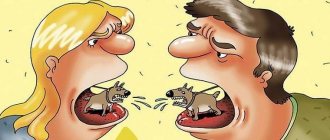Food addiction is a form of psychologically determined addictive behavior, expressed in a person’s inability to resist the need to eat. Moreover, the need is not caused by a physiological feeling of hunger or thirst, but by a psycho-emotional state that entails such an activity as the absorption of food.
Food in modern society is becoming a drug, a legal permission to have fun, relieve stress, make an appointment or take a time out. The secondary benefits presented by the process of eating food are enormous - they will help a shy young man to communicate with a girl, and a person swamped with work will not be judged if he goes out for lunch, unlike a walk in the park, which takes the same amount of time. Food brings people together in certain companies, where easier and more pleasant communication begins - remember the cheerful laughter in the smoking room or near the coffee machine, and how it stops when people leave these places.
Signs of addiction are a change in the previous lifestyle and behavior, irritability and anxiety appear, relationships change, while the main part of a person’s thoughts revolves around food and there is an inability to refuse either thoughts on this topic or an extra piece of food. This dependence manifests itself mainly on sweet, spicy, fast food products, usually unhealthy foods containing fats and carcinogens.
How to get rid of food addiction - 3 deep reasons
Shame, guilt and punishment
The feelings that people with food addiction tend to experience more often than others are shame and guilt. These feelings are not always fully realized, sometimes it happens like this: some event happened to you in childhood, because of which you experienced a strong feeling of shame or guilt, and it still reaches out to you, pops up in your life, you can't forget him. Or it has an impact on all subsequent events: every time something like this happens, you immediately feel shame or guilt, even if there was no good reason for this.
“Shame, shame on you, what a horror, people will see, be ashamed...” If these words were often told to you in childhood, or were not spoken to you, but were taught to experience these feelings, then most likely they accompany you to this day. You experience one of these feelings or both at once, even where, by ordinary standards, you have not done anything shameful. And after an act that is truly unpleasant by social standards, you can be ashamed, scold, blame, and hate yourself for many months, and maybe even years.
Both of these feelings are formed due to the fact that a person allegedly did something wrong or looked inappropriate. The difference between them is usually that shame is experienced in front of witnesses, while guilt can be felt alone. If you tend to make excuses to others, then this is precisely because you are ashamed or feel guilty.
Shame and guilt go hand in hand with food addiction. How are these feelings and eating disorders related? They don’t accept you, they compare you, they try to mold you into someone better, they criticize you, shame you, punish you, or make you feel guilty. All this leads to non-acceptance of oneself, low self-esteem, self-hatred, the desire to correct oneself, change, disappear, hide, punish, mock oneself or teach oneself a lesson. Feelings of guilt and shame grow so deeply into your subconscious that you continue to punish yourself again and again, even if you are no longer guilty of anything. Or this: you deliberately do something that will make you feel guilty. And also something for which you will punish yourself later. Most often this happens unconsciously.
Punishment can be different: complete refusal of food as refusal of life. The desire to disappear, to dissolve, to hide, the feeling that you have no right to take up space. Another type of punishment is to cleanse the stomach by inducing vomiting immediately after eating. “I ate so much, what a shame! I deserve to be punished." Inducing vomiting in this case acts as a method of cleansing from sin, a way to free oneself from one’s own imperfection. Sometimes guilt and punishment are reversed: you may overeat precisely so that you have a reason to scold yourself.
I described the first reason that can lead to an eating disorder. Does being shamed as a child always cause you to suffer from food addiction as an adult? No. And if you have an eating disorder, does that mean you were shamed as a child? Also completely optional. But the tendency towards food addiction is precisely among those who often experienced shame and guilt in childhood.
Trauma of the Abandoned, Trauma of the Rejected
During my practice, I discovered another undoubted trend: those who suffered the trauma of being abandoned or rejected in childhood are more susceptible to food addiction. Abandoned trauma can result from the absence of a parent (one or both). For example, leaving your family, long business trips, death, emotional absence (no involvement in your upbringing), or you were sent to a camp or sanatorium. The trauma of being abandoned to a greater extent forms overeating or bulimia.
The trauma of the rejected person can be formed due to the fact that the parent was offended by you, did not speak for several days, or punished you with his inattention. Also, the parent could reject you in the literal sense of the word - push you away, not love you, not accept you as their child. Or push away today, and pull back tomorrow. Most often, this trauma forms anorexia.
How does abandonment trauma shape bulimia or binge eating? You replace the missing parent with food, or rather his affection, attention and closeness. You are trying to “eat”, to get more of what you had so little of as a child. The paradox of bulimia and overeating is that a person often wants to hide, run away, disappear, but at the same time unknowingly gains weight.
Anorexia nervosa is formed as a result of parental rejection of the child. A person begins to feel unworthy of this life, wants to disappear, dissolve, deprive himself of the space he occupies. “Since I was rejected by my parent, the person closest to me, it means I don’t deserve to live,” he thinks. And he deprives himself of food - the source of life. It is paradoxical that he strives to disappear, but the subconscious goal of refusing food is to be noticed, to be seen by the parent who rejects him.
Low self-esteem, perfectionism, imperfection
Most people with food addiction or eating disorders are people who were not accepted for who they are as children. Appearance, character, skills or talents - the parent was always dissatisfied with something, it was always not enough for him. If you got an A, you should have had two A's, if you got five A's, you should have gotten a six.
We took second place in the competition - a shame, took first - well, good. But it could have been better. We washed the floors of the house - and Masha from the next door also washed the windows for her mother.
As a result of such non-acceptance of your personality, perfectionism is formed - the desire to be the best in everything, constant comparison of yourself with others, the inability to come to terms with your own imperfections, an emphasis on shortcomings and failures. The desire to be appreciated, noticed, praised. But in reality, praise and pride from others do not bring proper satisfaction. Only a parent who is dissatisfied with you can calm down and stop the race for perfection. If he celebrates your achievements and ever tells you that he is truly proud of you.
The desire to become ideal is embodied in appearance: you want to be slim and beautiful, to be like the “ideal” people from social networks who live a beautiful life. They seem so happy.
The pursuit of ideality leads to detrimental consequences: refusal of food, constant monitoring of weight and calories consumed, which is why food becomes forbidden, and therefore the most desired source of joy. And it happens that this ultimately leads to overeating, and sometimes to overeating, followed by punishment in the form of a complete cleansing of the stomach.
Tip #4: Communication will help you overcome difficulties.
The most important thing when treating food addiction is not to close yourself off. You need to find the strength and desire to communicate with friends, family and loved ones. If for some reason this fails, you need to start visiting a psychologist or find a group of like-minded people. Sincere support from others will help you cope even during the most difficult periods of treatment.
Anxiety - cause and effect
Increased anxiety is an understandable and natural consequence of abandonment and rejection, perfectionism and low self-esteem, shame and guilt. This is a consequence that is also the cause of food addiction.
If we leave aside psychoanalysis and just open an anatomy textbook, we learn that when we chew food, blood flows from the brain to the digestive organs. All energy is directed to digestion processes. The brain stops worrying, being afraid, worrying. Your body has no time for this now; it devotes all its energy to processing food.
So the simplest and easiest way to calm the anxiety that has arisen is to start chewing. And it doesn’t matter whether the food passes through all the organs of the gastrointestinal tract, or comes out through the “two fingers in the mouth” operation - in any case, it will temporarily calm and relax you.
What about anorexia? In an anorexic, as a rule, due to a psychologically negative attitude towards food, the physiological component is also distorted: instead of proper calm in the process of chewing food, anxiety comes to him. And this anxiety continues to stimulate the further development of the disease.
Consequences
If a person is aware of his problem and wonders how to overcome food addiction, then he is already on the right path. However, to get the full picture, you should be aware of the possible consequences of food addiction.
Side effects of this disease include:
- obesity;
- diseases of internal organs - liver, kidneys, pancreas, etc.;
- problems with joints and musculoskeletal system;
- diabetes;
- problems with respiratory function.
Thus, with food addiction, psychological illnesses can turn into serious health difficulties.
How to get rid of food addiction on your own
How to get rid of food addiction on your own, and is it even possible? Yes, it's possible. To do this, you need to be a fairly conscious person, understand at every moment what you are doing and why, be aware of what is happening, learn to regulate your focus, take care of it and direct it to where you need it.
In other words, you must learn mindful thinking on the road to recovery. Here's what awaits you along the way:
- In order to understand how to get rid of food addiction on your own, I recommend that you start by understanding the causes of your disease. There may be many of them, or there may be just one. For a more complete understanding, you should also read the article that reveals exactly your disorder. After reading this article, you can follow the link you need: anorexia, bulimia, overeating
- You can work through the trauma of someone who has been rejected or abandoned through the technique of forgiveness. You can do it by following the link. Or, if your parent is alive, talk to them about it. Your recovery is much more important than your pride or fears of communicating about such personal topics. Start talking about how painful, offensive and difficult it is for you. Believe me, you can do it. And this could be a key step towards your recovery.
- Praise yourself for every, even the smallest step towards your recovery. And forget even to think about insults, criticism and guilt. This is an incredibly important point on the path to recovery from food addiction. You need to wean yourself from criticism and train your brain to receive encouragement in the form of praise for every small step towards healing. And then he will unconsciously do everything to make you recover.
- And most importantly, take the first step today. Write a goal and break it down into a huge number of steps. Take the first step right now. The remaining steps should also be taken in the coming days. This will start the work of your brain on the path to health.
A person prone to addiction, as a rule, is in the role of a victim. He cannot solve the problem on his own, needs support and looks for excuses for himself. If this sounds like you, then I wrote a book for you, “From Victim to Hero: The Path of a Strong Man.”
After reading it, you will stop looking for excuses outside, learn to take responsibility and begin to actively change everything that does not suit you in life.
You can read the full description and reviews of the book, and also purchase it using the link.
This is a book that will become your bridge from victim to hero - a strong person who is not content with what he has, but changes until he is absolutely satisfied with his life.
Tip #2: Get rid of irritants
It is necessary to remove all high-calorie foods from the house at the time of treatment and for some time after it. It is worth remembering that willpower at the time of food addiction is practically absent, and a person can break down at any moment.
Only foods allowed by the diet should be left in the refrigerator. At the same time, they must be distributed in advance for certain meals. It is best if these are containers with breakfast, snack, lunch, afternoon snack and dinner.
When is a specialist needed?
In most cases, a person cannot cope with addiction on his own because it is unconscious. It is difficult for a person to understand and analyze why he overeats or refuses food, and what exactly prompts him to do this. And due to a lack of understanding of how to get rid of food addiction in his particular case, he simply gives up and decides to live with it.
The reasons that led to the onset of the disease are often denied, repressed (forgotten), not recognized, or the person simply does not admit to himself their existence. This is the main problem of self-treatment: most people are not able to realize, see and feel the motives of their behavior.
Food addiction is a socially acceptable disease, it is so common that there seems to be no obvious reason to seek professional help. It would seem that almost every person has problems with eating behavior - so how then can we call it a pathology? But most diseases are triggered precisely by eating disorders, with cravings for taste enhancers and sweets, refusal to eat or inducing vomiting. Underestimation of nutritional disorders leads to dire consequences, such as dysfunction of the intestines, ovaries and, as a consequence, absence of the menstrual cycle, loss of teeth, leaching of microelements and vitamins.
From a psychological point of view, eating disorders are often the cause of social isolation, fears, anxiety, apathy and depressive disorder.
In this case, the assistance of a specialist is required. You cannot put up with the disease and drag it out for a long time, because this is fraught with serious organic and mental damage. I am a psychologist and provide individual consultations via Skype. I can help you understand the causes of your illness and recover from it. We will work with both childhood injuries (if they were the cause) and your current condition. The healing process consists of awareness of all the processes occurring in your psyche and your body. Also during consultations, I help you understand what exactly will help you restore a normal attitude towards food and your appearance.
You can sign up for a consultation and see the cost using the link. Read reviews of my work here.
Sign up for a consultation via Skype
Tip No. 3: sport is the best helper
Thanks to physical exercises, you can solve two problems at once, namely:
- Start losing excess weight and getting your body in order.
- Ensure the production of serotonin and dopamine.
An active lifestyle is the best helper for many health problems, both physical and mental. At the same time, physical activity does not have to be exhausting and too heavy. You can start with walking, then gradually switch to light running, gymnastics, etc. You should make a plan for yourself and follow it. You need to write down your results in a separate notebook. After two to three weeks, changes will already become noticeable.
"Dead" food that is addictive
The worst thing is that the unnatural craving for the absorption of large volumes of food concerns, first of all, junk food. It would be nice if we compulsively chewed carrots or never parted with a bunch of green onions. Although, even here, too much is not good, but it is not as harmful as excessive consumption of hamburgers.
Nutritionists conventionally identify three types of food that cause the greatest harm to our body. She, alas, is also the most “attaching” one, and it is on her that dependence is most quickly formed.
The first group of products includes “pure” sweets: candy, ice cream, chocolate.
The second category is baked goods and cookies rich in fast carbohydrates. It is precisely because they are quickly absorbed into the blood that there is a surge in the feeling of satiety, but very soon it ends, and the body requires another batch of energy and emotional nourishment.
Dishes made from foods high in fat are classified in the third group.
There is also a fourth, which includes food “perversions” containing all the above-mentioned harmful things. These are cakes, eclairs, hamburgers and other “delicacies”, also richly flavored with flavor enhancers, firmly riveting them to “gourmets”.
Related articles:
Kinds
Psychotherapists identify the following types of illness.
Depending on the reasons:
- psychological/mental;
- physiological/physical.
Depending on the severity of the disease:
- mild severity, when a person is partially able to control and limit the amount of food eaten;
- moderate severity, when the addict tries to deal with the problem, but most often he fails;
- advanced stage, when the disease is not recognized, despite all the signs and consequences.
Depending on the products:
- general;
- chocolate;
- sugar;
- meat;
- carbohydrate;
- fast food;
- cheese;
- beer (dependence on snacks to alcoholic drinks), etc.
Depending on the manifestations:
- paroxysmal: ravenous hunger is felt from time to time;
- chewing: the need to constantly chew something;
- non-stop: a person follows a meal schedule, but cannot stop while eating and absorbs it until the pathological state of a full stomach;
- nocturnal: during the day a person may not feel hungry at all and eat little, but at night the appetite becomes uncontrollable.
Symptoms of the disease
The following signs help recognize psychological dependence on food:
- uncontrollable cravings for certain foods or tastes;
- deprivation of self-control: inability to refuse systematically eating candy, fast food or other foods;
- remorse after each overeating, feelings of guilt;
- low self-esteem;
- eating food quickly and intolerance if food is eaten too slowly;
- perception of food as a means of compensation for stress or reward for achievements;
- panic when feeling hungry;
- underestimating the volume of the portion eaten;
- greed, reluctance to share food;
- lack of sense of proportion;
- denial of the presence of excess weight or its deficiency;
- constant thoughts about food.
Methods of self-medication
To overcome food addiction on your own, psychologists advise following four steps:
Motivation. A person must admit that there is a problem and find incentives to solve it. For example, set a goal to lose weight, improve your health, or gain respect among colleagues or friends. Self-realization
Food addiction often occurs due to a lack of positive emotions, so it is important to find something interesting to do. Try to remember what you liked before the addiction appeared, start playing sports, sign up for dancing or a hobby group
Preparing the right diet. Try to exclude fried, fatty, sweet and foods that have taste preferences from your diet. Start eating more fresh vegetables, fruits, and whole grain cereals. Eat in small portions. Work on your own self-esteem. Learn to correctly perceive yourself and the world around you, love your body and do not try to seek solace in food.











